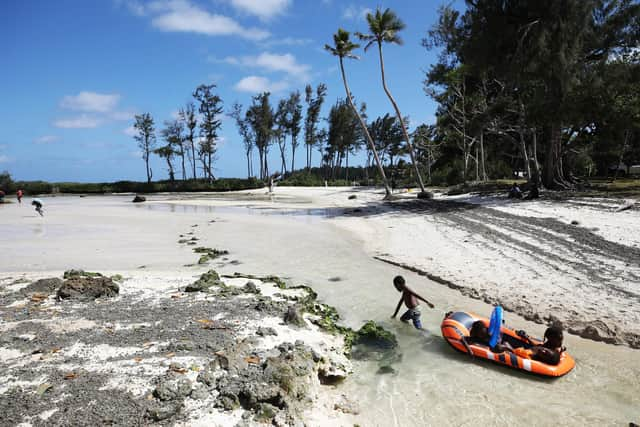COP28 climate change summit: Why Scotland and Vanuatu have forged a new bond in fight against global warming – Ralph Regenvanu
It may not be immediately obvious to readers of The Scotsman what connects the tropical paradise of Vanuatu in the South Pacific with Barra in the Outer Hebrides. Both places have a rich cultural and historical heritage and the people who live there today continue to be proud and active members of their communities. It is also true, that, like many other island economies, the citizens who live there face higher energy prices and often rely heavily on non-renewable sources of energy.
Yesterday, at the COP28 summit in Dubai, the governments of Vanuatu and Scotland laid the foundations for a historic agreement which I hope will pave the way for Ni-Vanuatu (our people) and Scots to find out more about the climate challenges we share and allow our vibrant island communities to work together to make their homelands more climate resilient.
Advertisement
Hide AdAdvertisement
Hide AdVanuatu has been inhabited for more than 4,000 years but in 1774 Captain James Cook renamed the islands the New Hebrides after the Hebrides archipelago many of you will be very familiar with. Following 74 years of Franco-British “Condominium rule”, we gained our independence in 1980 and became a member of the United Nations in 1981.
As the climate change minister for the Republic of Vanuatu – a country of 308,000 citizens situated about 1,750 kilometers east of Australia and 500 kilometers northeast of New Caledonia – I am only too aware of how climate change impacts present an existential threat to countries, people and nature around the world, and that islands in particular are vulnerable.
That is why Vanuatu has been leading an ongoing push for an advisory opinion from the International Court of Justice (ICJ) on "how existing international laws can be applied to strengthen action on climate change, protect people and the environment, and save the Paris Agreement”. We are proud of the role we have been playing on the international stage – including leading a coalition of nations at the UN General Assembly that in March 2023 secured a rare adoption of a resolution by consensus amongst 132 of the UN’s member states. This speaks to the compelling case established and advanced by Vanuatu and its ICJ core group.
Whilst focusing on mitigation – reducing greenhouse gas emissions in the atmosphere – both Vanuatu and Scotland are also working on climate change adaptation. In particular, both countries agree the need to develop higher levels of resilience to climate-related disasters. We welcome that Scotland also has an ambitious target of reaching net zero by 2045.
Access to renewable energy is a top priority for both countries, especially in outer islands in Vanuatu and on Scottish islands. Community-led climate action is also paramount to both with Scotland showing leadership in this field with the Carbon Neutral Islands project.


Our planned Memorandum of Understanding will establish a Vanuatu Scotland Forum on community-led climate action that is scheduled to meet at least three times a year to identify the challenges and opportunities communities in Vanuatu and Scotland face in relation to accessing renewable energy and building climate resilience.
We plan to share with each other local and global good practices as well as local, regional, and global funding opportunities for programmes that will enable improved access to renewable energy and improved climate and emergency response capability. We look forward to working together to identify suitable organisations in Scotland and Vanuatu which can implement programmes designed to do this.
The first collaboration between Scotland and Vanuatu has already been launched in the form of a community-focused “Island Energy and Resilience Hubs” programme for Vanuatu’s outer islands. Drawing on the experiences and expertise of the Scottish Islands Carbon Neutral Project, a six-year programme of investment and development has commenced, led by Orkney-based environmental consultants Aquatera along with the Commonwealth’s Climate Finance Access Hub and our own National Green Energy Fund.
Advertisement
Hide AdAdvertisement
Hide AdThis project benefits directly from Scotland’s technical expertise and existing international collaborations and we hope it will serve as a model for replication and scaling – not only within Vanuatu, but as a blueprint for other Pacific islands to embrace as we lead the way in positioning Vanuatu as a sustainable development hub for the South Pacific region.
Whilst in Dubai, it was good to meet many representatives from across the United Kingdom including Opposition Leader, Sir Keir Starmer, as well as the Secretary General of the Commonwealth, Baroness Patricia Scotland KC. And in partnership with the Commonwealth, and other strategic partners, Vanuatu will lead the establishment of a climate transition finance fund.
Island communities, whether they are in the South Pacific or North Atlantic understand more than most the power of our environment and the impact of climate change. Vanuatu is on the front line of the climate emergency and what is agreed at COP28 matters immensely to us. But it matters to everyone across the world, not least in Scotland.
That is why I welcome the leadership shown by Scotland and Vanuatu and look forward to developing ever closer relationships between Scots, Ni-Vanuatu, our island communities, and our two countries.
The Honourable Ralph Regenvanu is Vanuatu’s minister for climate change adaptation, energy, environment, meteorology, geohazards and disaster management
Comments
Want to join the conversation? Please or to comment on this article.
